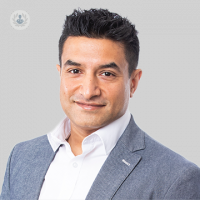Weight loss surgery to reverse type 2 diabetes: how does it work?
Written in association with:Weight loss surgery (gastric band, bypass or sleeve gastrectomy) can be lifechanging for patients who live with type 2 diabetes and it can even reverse the condition.
We asked one of London’s leading bariatric surgeons Mr Sanjay Purkayastha all about surgery for type 2 diabetes, including the possible risks of the procedure and what lifestyle changes you will need to make post-operation.

How is bariatric surgery effective in treating type 2 diabetes?
Different bariatric operations have different effects on hunger hormones, insulin resistance, appetite and satiety. Because of the combination of all factors, these mechanisms causing weight gain can also lead to insulin resistance, which causes people to become pre-diabetic and then diabetic.
There are numerous studies that show that a patient, who is obese or morbidly obese with pre-diabetes or type 2 diabetes, can put the condition into remission if they are able to lose weight and keep it off.
There have been many controlled trials (gold standard), which show that bariatric surgery by far surpasses any medical treatments, or lifestyle or behavioural changes, for the long-term management of type 2 diabetes in those who are obese or morbidly obese.
Can all obese type 2 diabetes sufferers have metabolic surgery?
Currently in the UK, if you have a BMI of 30 or more and have type 2 diabetes, you qualify for metabolic surgery. If you are of Asian origin with a lower BMI of 27.5 then you may also qualify for metabolic surgery. The effect diabetes has on the organs, such as in cases of kidney failure, is progressively much worse for people of ethnic origin.
Is there a "best" bariatric surgery for treating type 2 diabetes?
The choice of surgery depends on lots of medical factors and what it might indicate or what it might contradict.
With Crohn’s disease and type 2 diabetes, for example, you can’t have a gastric bypass due to future screening reasons. If you have really bad acid reflux and type 2 diabetes, then you shouldn’t have a gastric sleeve.
Each patient case is assessed on a personal basis and the most important thing is to engage with the whole team that you will work with. Surgery, in combination with lifestyle changes, offers the best permanent solution for sustainable weight loss.
It is important to note that the majority of trials look at people with sleeve gastrectomy and gastric bypass. These tend to be the two surgeries in scientific literature that prove to be the most effective options, even more so than the gastric band.
How soon after a first consultation can patients have metabolic surgery?
This depends on your blood test and medical assessment results. You will be working with a multidisciplinary team and will have to see a dietician, psychologist and anaesthetist for review.
We don’t advocate that you rush into having metabolic surgery and it does depend on your BMI. If you require surgery for medical problems except for diabetes, which is controlled, you may need to follow a two to six-week diet prior to surgery.
If you are using techniques such as dieting, injections, taking weight loss tablets and making behavioural changes, the earliest you can have surgery is within four to six weeks.
The best results are achieved when you really engage with our nutritionist, psychologist and surgical team who are here to support you on your weight loss journey.
What are the risks of metabolic surgery for type 2 diabetes?
Metabolic surgery is very safe in the correct hands and at a reputable medical centre. This is complex abdominal surgery, but the incidence of serious complications within our team is less than 1 in 100. We have very little risk of weight regain and other common complications with our patients.
Patients are fully informed about the risks through our online platform, which is a resource they can use as guidance throughout the whole process. We have a personalised bespoke app for our patients to download to their smartphone. We offer a digital concierge before, after and during surgery for support.
What is the cost of metabolic surgery for diabetes based on?
The overall cost of metabolic surgery is based on a few factors, such as the hospital cost, which is usually one to two night’s stay, plus the cost of all of the latest technological advanced kit to be able to do the operation. With a gastric band, for example, you have to pay for the port that we use, plus the cost of the surgery itself, anaesthesia and the follow-up care.
Prior to surgery, there is the cost of seeing our dietician and nutritionist, the psychologist and you will need to have all of the necessary blood tests.
A lot of people who are overweight and obese cannot conceive and it is important to highlight that metabolic surgery is cheaper than IVF (a third of the cost). If your single problem when trying to conceive is your weight, I highly recommend private bariatric surgery.
Will patients need to change their lifestyle after metabolic surgery?
There are new habits that you will need to adopt. After any bariatric surgery, you will need to eat much smaller portions of food and do so very slowly. It is important to chew carefully to ensure you don’t swallow any air when eating, and that you are more mindful about your food choices. Most importantly, when you feel full, recognise that you should stop eating.
You will need to have a lifelong vitamin supplementation and, depending on which operation you have, you may need to take acid reflux reducing medication for a few months. We encourage you to be more active after recovery and to have a high protein intake and drink plenty of water.
Overall, we encourage you to overhaul your whole lifestyle to become healthy. The surgery and the support from our team can help you to change your life for the better, permanently.
If you would like to discuss your weight loss surgery options with Mr Purkayastha, you can book an appointment with him via his Top Doctor’s profile here.


